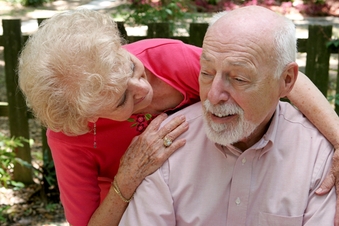MEETINGDEM* includes UK Dementia Meeting Centres based on the success of
125 DMCs in Holland.
* Meetingdem means an entire European project.
Keep up-to-date via @MeetingCentres
Contents
Sections of text are numbered to aid discussion and for email etc use.
- The author's strong belief
- The main benefits to both cared-for and carer
- Outstanding results for both
- Person-centred care
- The here and now
- The future - your opportunity to participate
- Spread the word
- More information
- Represent an organisation?
- Your stamina

1 The author's strong belief
This page results from the website author's strong belief in the continuity of the too-few UK DMCs and the creation of more. My early-stage-dementive wife and I attend one on a regular basis and both are convinced that DMCs present the optimum way forward within national dementia services.
Teresa is unable to express her view in those words. However, she loves her once-a-week sessions even though there's an hour of a journey there and a longer one back (rush-hour).
Many carers take their carees to a daycare centre and collect them later. The huge difference between a daycare centre and a DMC is that carers participate in the wider aspects of the care process which is person-centred.
Depending on the capacity of their caree to remember what took place, combined with the level of cooperation of the daycare staff, the feedback can vary on the worth of a specific daycare centre.
DMC-participating carers enjoy the carers-organisers relationship where carer needs, wants and views affecting them and their loved-ones have a clear influence on the nature and content of the caring and other aspects of what happens. They enjoy sharing the caring when, normally, it is a one-to-one activity.
2 The main benefits to both cared-for and carer
The main benefits for people with dementia who visit the DMCs are that they show fewer depressive symptoms and they have a higher self-esteem than carees in regular daycare. Furthermore, admission to a care home is postponed.
The main benefits for their carers is that they experience more support, have an increased feeling of competence, and feel less burdened. Their morale is heightened by participating with their peers, and the DMC staff, in the care given to their loved-ones, and others, with dementia.
Other benefits are listed later.
3 Outstanding results for both
DMCs have been successful in the Netherlands for over ten years. The approach is based on outstanding results and is person-centred, focusing on helping people with dementia, their carers, and their families adapt to living with dementia.
FAQ - How are these results achieved?
Good question.
Let's suppose there are 100 couples involved. Cared-for and carer. They are split into two groups. Group A couples are studied and asked questions etc but attend normal daycare facilities. Group B attend DMCs and are asked questions. There's no need for specific group members to know about the other group.
Both groups are asked questions involving morale, mood, depressive symptoms, self-esteem, etc. Notes are taken on how long it takes anyone to be admitted to a care home.
The DMC results in 2 The main benefits speak for themselves. Ditto the next section which is one of the most acclaimed benefits - person-centred care.

4 Person-centred care
The key points of person-centred care are:
- treating the person with dignity and respect
- understanding their history, lifestyle, culture and preferences, including their likes, dislikes, hobbies and interests
- looking at situations from the point of view of the person with dementia
- providing opportunities for the person to have conversations and relationships with other people
- ensuring the person has the chance to try new things or take part in activities they enjoy.
participate
Anyone aiming to improve dementia care services in their area would not expect to find all they need on one sheet of A4 or a small webpage.
It is appropriate from the start to emphasise that there is plenty to be read and plenty of meetings. This is the tip of the iceberg. Say "Cool!" and sign up.
The project needs community as well as professional support to keep the two DMCs going and to create more.

Do something practical if you have enough info, do it if you don't.
Become a volunteer. There are no DMC volunteer stories. Carers UK runs a relevant carer story. See "Although challenging, I find caring, working and volunteering very rewarding" here. Make contact for help in finding a dementia situation.
How to set up a Local Dementia Action Alliance
For advice on setting up a Local Dementia Action Alliance download this toolkit: Getting Started
7 Spread the word
Please paste this into emails you send:
Have you heard about the new Dementia Meeting Centres? Even if you or yours are not exposed to dementia , there's the chance of it occuring to you and/or someone you love one day. Be prepared. Start asking questions.
Your opportunity to participate in the future of UK Dementia Meeting Centres is
via http://carerworld.yolasite.com/worcdemdmcppub.php
Please pass this email on to your contacts.
9 Represent an organisation?
Make contact and receive the correct set of pages
_______________________________
pagetop for pasting MEETINGDEM Your opportunity to participate in UK DMCs page here
Dementia Meeting Centres - synopsis - here
A DIY Dementia Meeting Centre for your local community here
UK Dementia Meeting Centres Home page here
